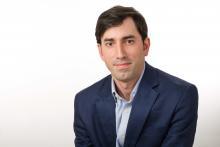Michael Bloomberg for President?
Former New York City Mayor Michael Bloomberg must know that this is his last rodeo. If he does not run for President in 2016, the year in which he turns 74, there will be no opportunity for him in four years. News reports suggest that he is giving serious thought to a third-party candidacy and is willing to spend perhaps a billion dollars of his personal fortune to make the run. In his deliberations, there are three fundamental questions he must consider: Is there an opening for a third-party candidate? What is his rationale for running? And, can he win? Let's consider each of these.
First, there surely seems to be an opening for a third-party candidacy. Both major parties, the Republicans and the Democrats, appear vulnerable to third-party challenges. To take the Republicans first: The two candidates who have the clearest path to the nomination are Donald Trump and Ted Cruz.
It is hard to imagine either one of these men winning the presidency. Donald Trump is a nativist and xenophobe. He has risen to the top ranks of GOP contenders by making a series of ever more outrageous promises. He will expel eleven million undocumented aliens and build a wall on the Southern border. He will make Mexico pay for that wall. He will at least temporarily halt the travel of Muslims to the United States. Each of these promises is offensive. Taken in their entirety, they are not so much a political platform as a cry for a racially, religiously, and ethnically purer United States. It is a disgusting platform, in other words, that is wholly unbefitting of an American leader.
At the moment, Ted Cruz is Trump's only plausible challenger. Cruz is a one-term Senator from Texas who in that single term has caused unparalleled mischief. He played an instrumental role in the government shutdown in 2013. He has poisoned the atmosphere between establishment and insurgent members of his own Party. The chairman of his superpac, David Barton, has been plausibly described as a Christian nationalist. Certainly, a review of Barton's writings suggests that he favors a radical revision of the constitutional law of church and state and there is every reason to believe that Cruz shares that view.
The Republican Party has experienced insurgency candidacies before. But this year is different. The GOP Establishment is in disarray. The Jeb Bush coronation never materialized and none of the other Establishment candidates have gained much traction. Some members of the Establishment (most notably Bob Dole) have even expressed a willingness to acquiesce to a Trump nomination. Is it exhaustion? Surrender? A bankruptcy of ideas? Call it what you will, the Establishment has failed.
But what about the health of the Democratic Party? Certainly, its vital signs are stronger than the Republicans. But one can still discern fissures within the Democratic coalition. Hillary Clinton is no Jeb Bush, but she does represent a political dynasty and this year at least is not a good time for dynastic candidacies. For sure, Clinton has numerous accomplishments. She was a Senator from New York. She completed a successful term as Secretary of State. But substantial segments of the Democratic Party are craving a new face.
Bernie Sanders has become that improbable new face. He is summoning Democrats back to the principles and ideals that animated the Party from the days of Franklin Roosevelt, through Harry Truman, and on to Lyndon Johnson. He favors health care for all, a living wage, low-cost college, a renewal of the civil-rights movement, and hope for a broadly-shared prosperity. This platform is not a radically socialist agenda, but the fulfillment of old progressive promises of a juster, fairer America.
The Democratic contest, in other words, is evolving into a struggle between the head and the heart, the pragmatism of Hillary Clinton pitted against the aspirations of Bernie Sanders. And most such contests get heated, even nasty.
So, yes, there is a potential opening for Michael Bloomberg in what could become a bipartisan mashup.
So, let's turn to the second question: What is Bloomberg's rationale? Most recently, he has devoted his time and his treasure to challenging the power of the gun lobby. Guns have acquired totemic significance in American society, and Bloomberg has quite laudably sought to move public opinion in the direction of gun control and gun safety. But a presidential candidacy must have a broader platform than this single issue.
The most logical issue for Bloomberg to make his own is his economic expertise. He has enjoyed a long career on Wall Street. Equity and credit markets are in turmoil around the globe. Credible economists now forecast the possibility of a significant economic slowdown, perhaps even a global recession.
If Bloomberg were to run, he would likely want to position himself as a centrist on these issues. If Donald Trump were his Republican opponent, he would challenge Trump's advocacy of protectionist trade policies. And if Bernie Sanders were his opponent on the left, he would attack him as a "tax-and-spend liberal." His most difficult opponent would probably be Hillary Clinton.
Could Bloomberg win? If he runs, I suggest that the closest historical parallel might be the 1912 presidential campaign. In that year, the Republican Party broke in two. Theodore Roosevelt, who had served as president from 1901 to 1909, grew dissatisfied with his hand-picked successor, William Howard Taft, and sought to unseat him at the Republican convention. When that effort failed, Roosevelt ran as a third-party candidate on the progressive Bull Moose Party.
In the general election, Roosevelt succeeded in marginalizing Taft, his Republican opponent, who carried only two states and won eight electoral votes. Still Teddy Roosevelt lost the general election, even though he held Woodrow Wilson, the Democrat, to a little less than 42 % of the popular vote.
As a third-party candidate, Bloomberg would need to distinguish himself from the other two main contenders and hope to marginalize one of the them. His most logical target, again assuming he is the nominee, would be Trump. Bloomberg would try to paint Trump as a bully and a buffoon, and attempt thereby to rally center-right voters to his candidacy.
Hillary Clinton, on the other hand, would be a more difficult target. If faced with a Bloomberg challenge, Clinton should emphasize her progressive credentials. She must promise to preserve and protect Social Security and Medicare and to ensure access to health care and education. She must, in other words, hold out hope of a brighter future for all Americans. She would also need simultaneously to show that Bloomberg represents a grasping plutocracy at its worst.
Who would prevail? All I shall say now is that it could be close.
TO FOLLOW WHAT'S NEW ON FACTS & ARTS, PLEASE CLICK HERE!
This article is brought to you by the author who owns the copyright to the text.
Should you want to support the author’s creative work you can use the PayPal “Donate” button below.
Your donation is a transaction between you and the author. The proceeds go directly to the author’s PayPal account in full less PayPal’s commission.
Facts & Arts neither receives information about you, nor of your donation, nor does Facts & Arts receive a commission.
Facts & Arts does not pay the author, nor takes paid by the author, for the posting of the author's material on Facts & Arts. Facts & Arts finances its operations by selling advertising space.

















